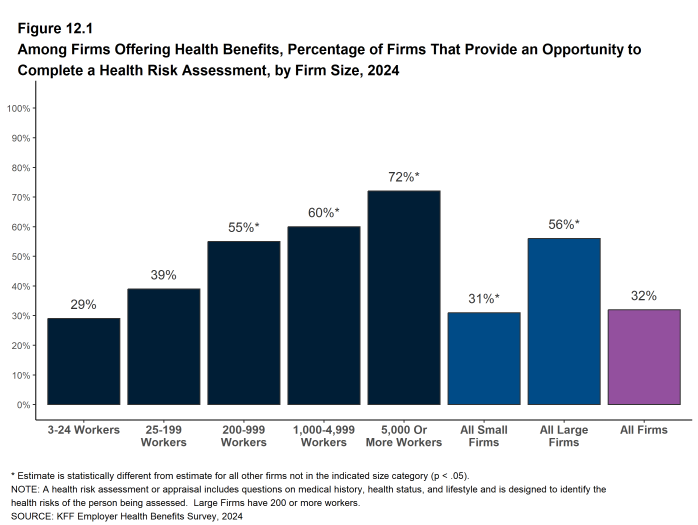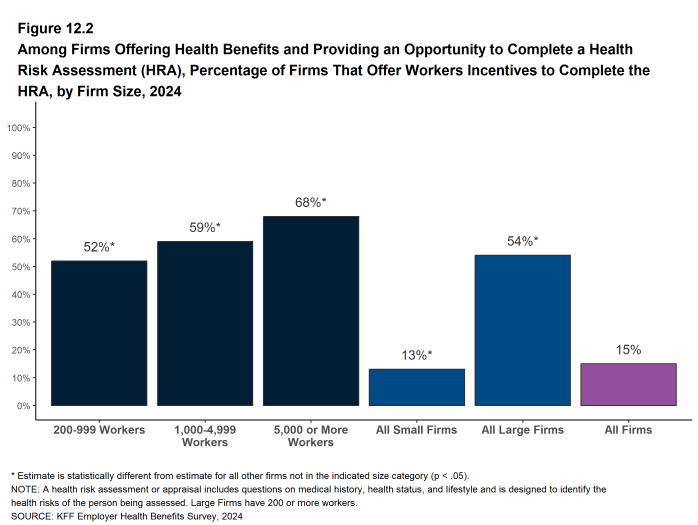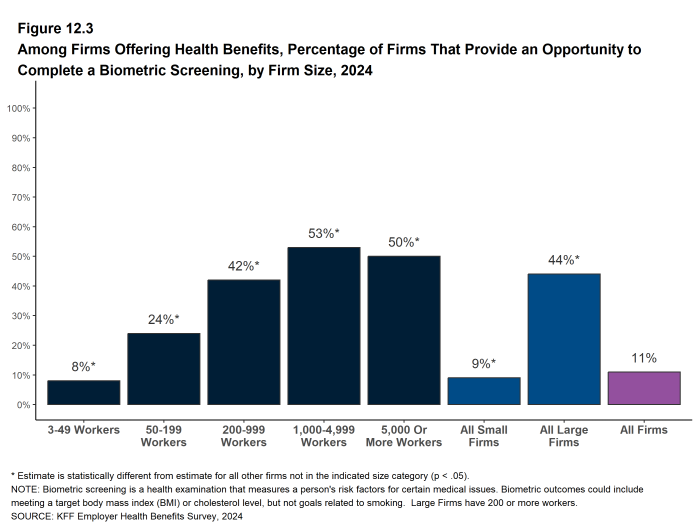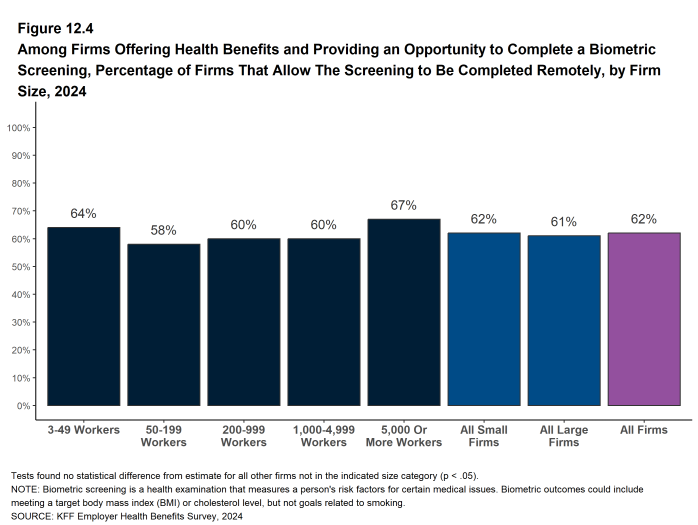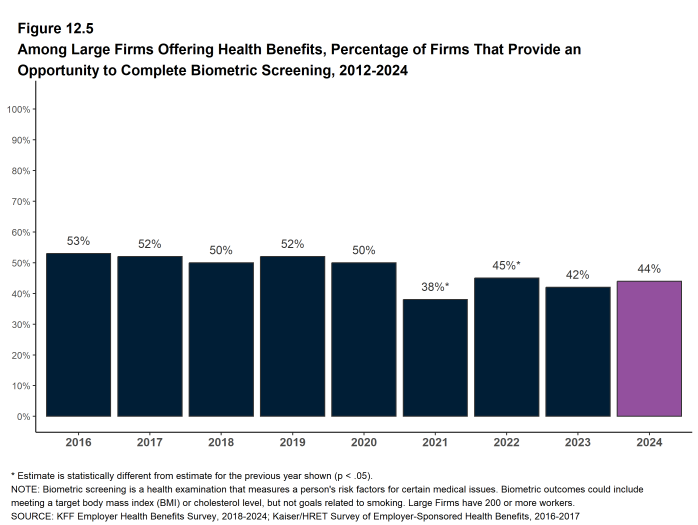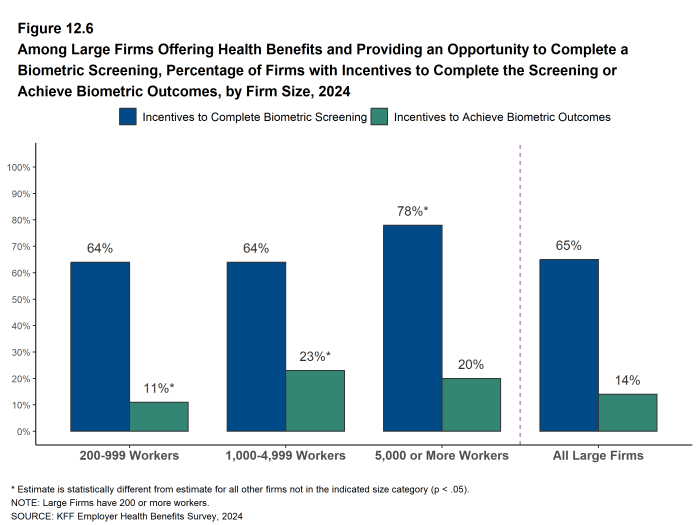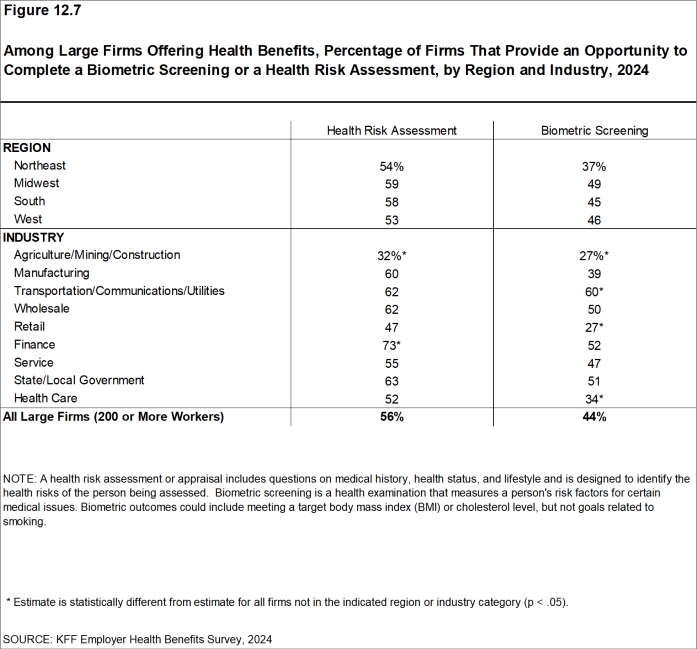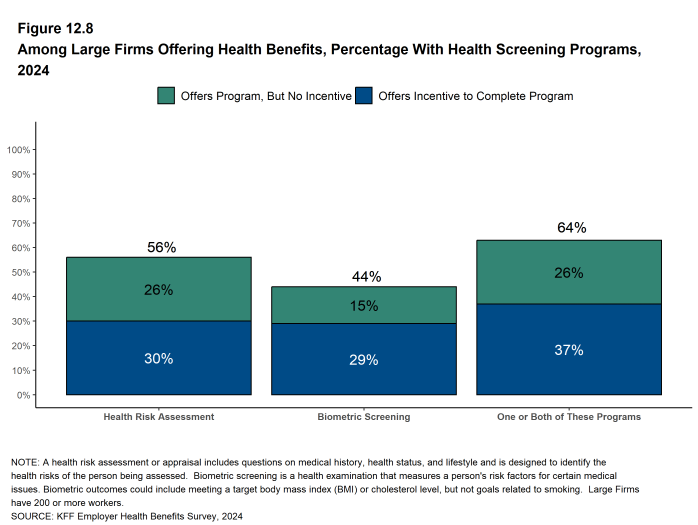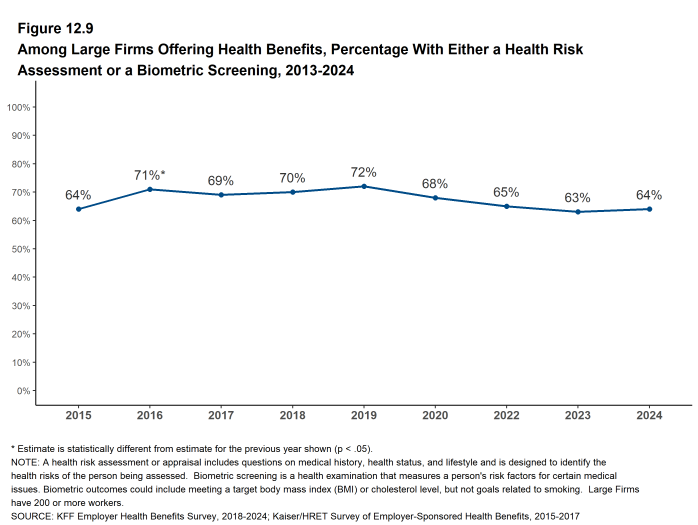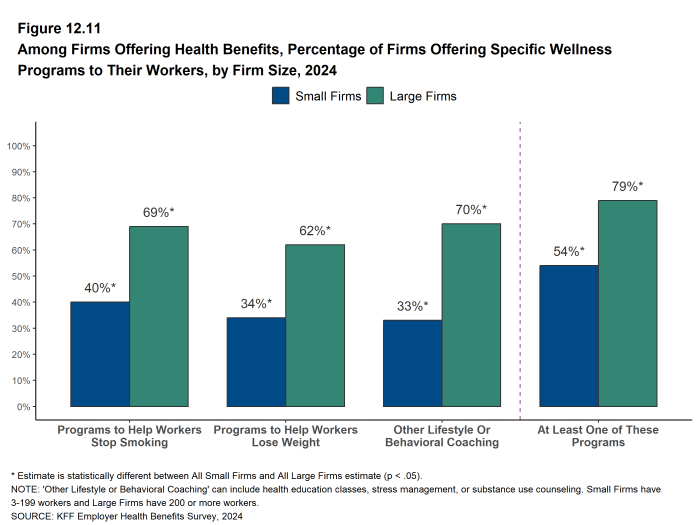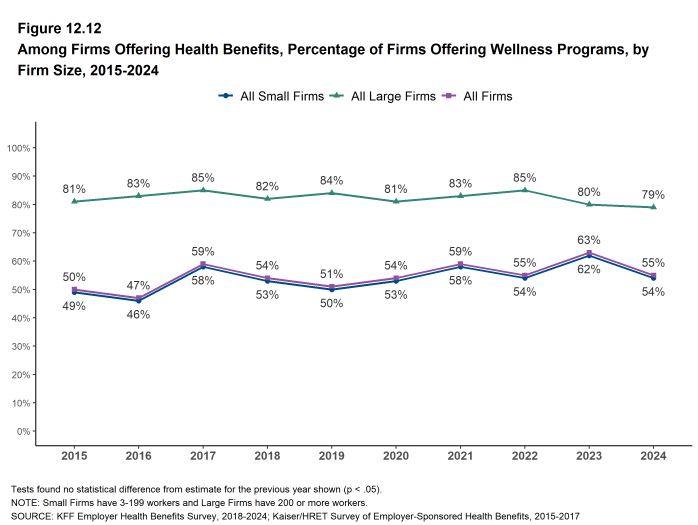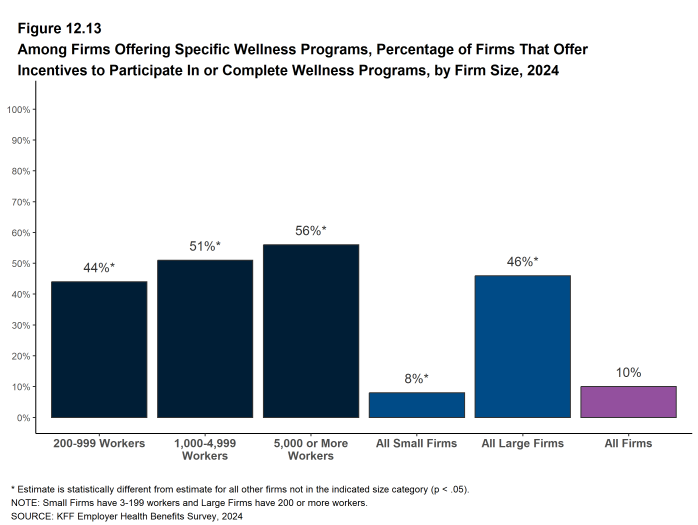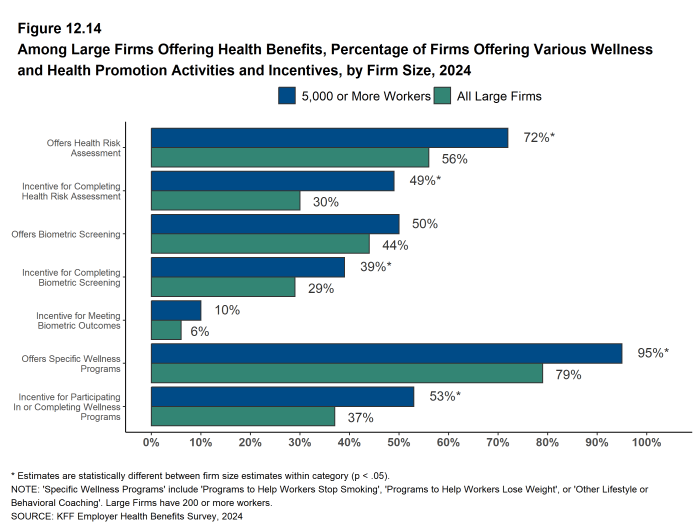2024 Employer Health Benefits Survey
Section 12: Health Screening and Health Promotion and Wellness Programs
Most large firms offer some form of wellness program to help workers and their family members identify health issues and manage chronic conditions. Some employers believe that improving the health of workers and their family members can improve well-being and productivity, as well as reduce health care spending.
In addition to offering wellness programs, many large firms offer health screening programs. These include health risk assessments, which are questionnaires asking workers about lifestyle, stress, or physical health, and biometric screenings, which we define as in-person health examinations conducted by a medical professional. Firms and insurers may use the health information collected during screenings to target wellness offerings or other health services to workers with certain conditions or behaviors. Some firms have incentive programs that reward or penalize workers for different activities, including participating in wellness programs or completing health screenings.
Among large firms (more than 200 workers) offering health benefits in 2024, 56% offer workers the opportunity to complete a health risk assessment, 44% offer workers the opportunity to complete a biometric screening, and 79% offer workers one or more wellness programs, such as programs to help them stop smoking or lose weight, or lifestyle and behavioral coaching. Substantial shares of these firms provide incentives for workers to participate in or complete the programs.
Only firms offering health benefits were asked about their wellness and health promotion programs.
HEALTH RISK ASSESSMENTS
Many firms give their workers the option to complete a health risk assessment to identify potential health issues. Health risk assessments generally include questions about medical history, health status, and lifestyle. At small firms, health risk assessments are often administered by an insurer.
- Among firms offering health benefits, 31% of small firms and 56% of large firms provide workers with the option to complete a health risk assessment, similar to the percentages last year. The percentage of large firms giving workers this opportunity remains lower than the pre-pandemic level for large firms in 2019 (56% vs. 65%) [Figure 12.1].
- Among large firms giving workers the opportunity to complete a health risk assessment, firms with 5,000 or more workers are more likely to do so (72%) and firms with 200 to 999 workers are less likely to do so (55%) [Figure 12.1].
- Some firms offer incentives to encourage workers to complete a health risk assessment.
- Among large firms that offer a health risk assessment, 54% use incentives or penalties to encourage workers to complete the assessment, similar to the percentage (59%) last year [Figure 12.2].
Figure 12.1: Among Firms Offering Health Benefits, Percentage of Firms That Provide an Opportunity to Complete a Health Risk Assessment, by Firm Size, 2024
BIOMETRIC SCREENING
Biometric screening is a health examination that measures a person’s risk factors (such as cholesterol, body mass index (BMI), or blood pressure) for certain medical issues. A biometric screening involves assessing whether the person meets specified health targets (“biometric outcomes”) related to certain risk factors, such as meeting a target BMI or cholesterol level. As defined by this survey, goals related to smoking are not included in the biometric screening questions.
- Among firms offering health benefits, 9% of small firms and 44% of large firms provide workers the opportunity to complete a biometric screening [Figure 12.3]. These percentages are similar to those last year, but the percentage of large employers with a biometric screening program remains lower than the pre-pandemic level in 2019 (52%) [Figure 12.5].
- With increases in remote work, some firms developed options for workers to complete biometric screening remotely. Among firms providing workers the opportunity to complete a biometric screening, 62% allow employees to complete the screening remotely [Figure 12.4]
- Some firms with biometric screening programs offer incentives to encourage workers to complete the screening.
- Among large firms with a biometric screening program, 65% use incentives or penalties to encourage workers to complete the assessment, similar to the percentage year (67%) [Figure 12.6].
- In addition to incentives for completing a biometric screening, some firms offer workers incentives to meet biometric outcomes, such as maintaining a certain cholesterol level or body weight.
- Among large firms with a biometric screening program, 14% have incentives or penalties tied to whether workers meet specified biometric outcomes [Figure 12.6].
Figure 12.3: Among Firms Offering Health Benefits, Percentage of Firms That Provide an Opportunity to Complete a Biometric Screening, by Firm Size, 2024
Figure 12.4: Among Firms Offering Health Benefits and Providing an Opportunity to Complete a Biometric Screening, Percentage of Firms That Allow the Screening to Be Completed Remotely, by Firm Size, 2024
Figure 12.5: Among Large Firms Offering Health Benefits, Percentage of Firms That Provide an Opportunity to Complete Biometric Screening, 2012-2024
HEALTH SCREENING PROGRAMS
Among firms offering health benefits, 64% of large firms offer workers a health risk assessment, biometric screening, or both, similar to the percentage last year (63%) [Figure 12.9].
Figure 12.7: Among Large Firms Offering Health Benefits, Percentage of Firms That Provide an Opportunity to Complete a Biometric Screening or a Health Risk Assessment, by Region and Industry, 2024
Figure 12.8: Among Large Firms Offering Health Benefits, Percentage With Health Screening Programs, 2024
WELLNESS AND HEALTH PROMOTION PROGRAMS
Large shares of employers offer wellness and health promotion programs to help workers engage in healthy lifestyles and reduce health risks. These may include exercise programs, health education classes, health coaching, and stress-management counseling. These programs may be offered directly by the firm, or by an insurer or third-party contractor.
- Among firms offering health benefits, 40% of small firms and 69% of large firms offer programs to help workers stop smoking or using tobacco, 34% of small firms and 62% of large firms offer programs to help workers lose weight, and 33% of small firms and 70% of large firms offer some other lifestyle or behavioral coaching program. Overall, 54% of small firms and 79% of large firms offering health benefits offer at least one of these three programs [Figure 12.10] and [Figure 12.11].
- Forty-six percent of large firms offering one of these wellness or health promotion programs offer an incentive for workers to participate in or complete the program, similar to the percentage 46% last year [Figure 12.13].
Figure 12.10: Among Firms Offering Health Benefits, Percentage of Firms Offering Specific Wellness Programs to Their Workers, by Firm Size and Region, 2024
Figure 12.11: Among Firms Offering Health Benefits, Percentage of Firms Offering Specific Wellness Programs to Their Workers, by Firm Size, 2024
Figure 12.12: Among Firms Offering Health Benefits, Percentage of Firms Offering Wellness Programs, by Firm Size, 2015-2024
Figure 12.13: Among Firms Offering Specific Wellness Programs, Percentage of Firms That Offer Incentives to Participate in or Complete Wellness Programs, by Firm Size, 2024

